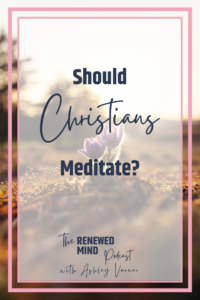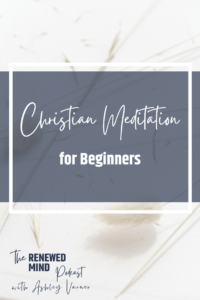If you’ve shied away from meditation because you’re not sure if it’s biblical or not, then this episode is for you!
Today we’re going to talk about the difference between Eastern meditation and Christian meditation, and I’m going to share with you what the Bible says about meditation. Then we’re going to see three results or outward benefits of following this practice.
Resources Mentioned:
Mindset Reset: https://ashleyvarner.com/mindset
The SoulTime App: https://www.soultime.com
Highlights from the Podcast:
Today we’re going to talk about the difference between Eastern meditation and Christian meditation, and I’m going to share with you what the Bible says about meditation. Then we’re going to see three results or outward benefits of following this practice.
The Difference
Eastern meditation is about putting the mind and body in alignment with each other by emptying your mind.
Christian meditation is completely different. It is bring your mind, body, AND heart into alignment with HIM by filling your mind with God’s Word. Essentially, Christian meditation is a form of prayer in a more structured setting. When I meditate, I’m intentionally reminding myself of who God is
and reflecting on His truths.
The goal is a deeper relationship with God through His Word and Jesus, who is our Mediator.
What does the Bible say about meditation?
Meditation or meditate is mentioned several times in the Bible. We read in Psalm 1:1-2, “Blessed is the one who does not walk in step with the wicked or stand in the way that sinners take or sit in the company of mockers, but whose delight is in the law of the LORD, and who meditates on his law day
and night.”
In Joshua 1:8, God tells Joshua “Keep this Book of the Law always on your lips, meditate on it day and night, so that you may be careful to do everything written in it.”

Meditating on God’s Word leads to a greater awareness of Him in your daily life.
Think of Moses or John the Baptist, or Jesus. The Bible says that they went away to fast and pray. I believe that meditating on the Word of God was part of their prayer time.
It prepared them for the work God had for them to do.
When you meditate on God’s Word, it brings your focus back to what really matters.
Our minds can get so caught up in everything going on. We wonder what other people think of us or we are taken back when something we said isn’t received in the way we meant it.
Someone types something on an instagram post or doesn’t respond to a text we sent and it can get our minds spiraling if we let it.
But when we make it a point to focus on Him, all those things fade away. Like the song, “Turn your eyes upon Jesus, look full in His wonderful face, and the things of earth will grow strangely dim, in the light of His glory and grace.”
Meditating on God’s Word leads to obedience.
Let’s look at the verses I shared earlier: in both of them, we see that the Bible mentions meditation and then it mentions obedience right after that.
Our lives are busy (and not just busy on the outside, but busy in our thought lives), so when we take time to stop and meditate on God’s Word it helps us to make better choices, it reminds us of His faithfulness and love so we want to obey Him.
If you are in a conflict with other people, before you respond to them or talk about them, choose to meditate on God’s Word first.
There’s a quote that says, “I have found that trying to become more like Jesus yields far better results than trying to become a better me.”
We become more like Him when we meditate on His word.

Meditating on God’s Word leads to a more balanced emotional life.
When I started the practice of biblical meditating, I started to track my moods, at first I saw huge dips and quick rebounds. As I continued the work maybe about 4 weeks in I could see those dips lessening. They were still there, they just weren’t as severe because I was experiencing my emotions
and taking my thoughts captive.
Recommended: The Soul Time App
In the Mindset Reset, I talk about the three ways people handle emotions. And I teach you how to fully experience your emotions. You may think that you’re experiencing them, but what I find is that most people are reacting or resisting them.